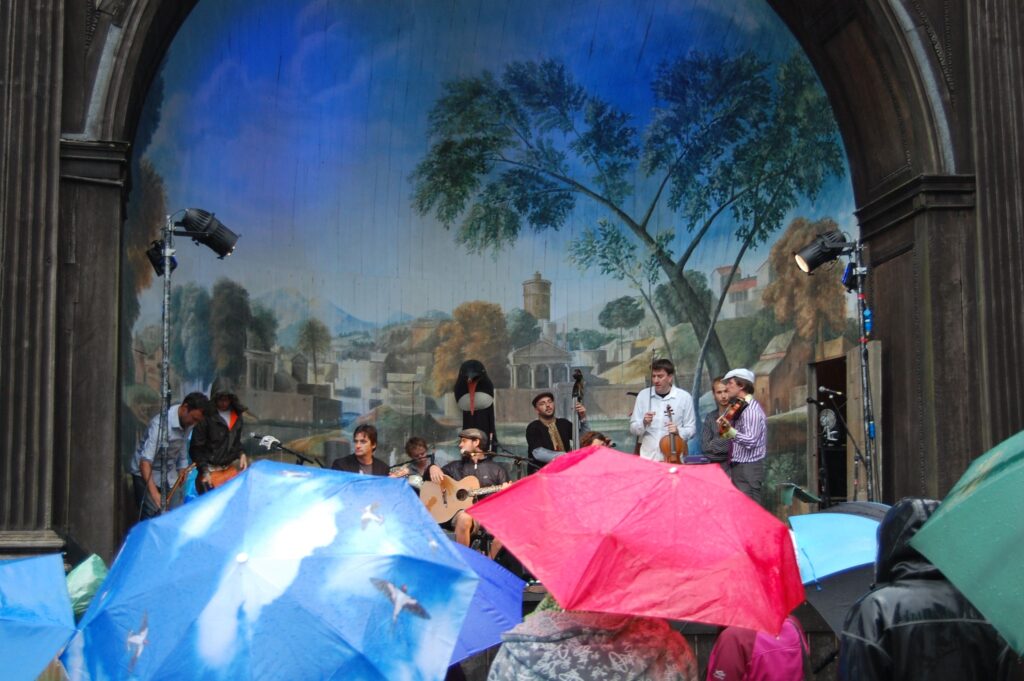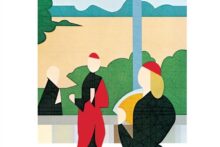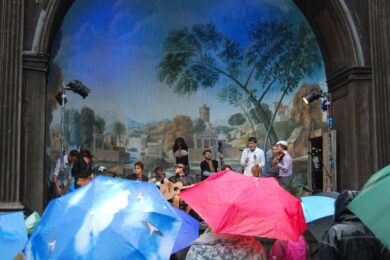The Penguin Cafe Orchestra formed nearly 40-years ago after Simon Jeffes had a vision of an Orwellian Britain brought on by food poisoning. In his feverish dystopian vision, the only respite from this grey loveless life of surveillance was a place called The Penguin Cafe, where a band played joyful music constantly. Together with Helen Liebmann, he decided to form a band of musicians, which would create this music and did so until his untimely death in 1997.
They made a gently surreal and playful form of neo-classical music that drew on various world folk traditions, minimalism, pop and avant garde.
More recently his son, Arthur Jeffes, has founded his own orchestra called simply Penguin Cafe to carry on playing his music. After a recent tour of the UK, we caught up with him to find out about an album of new material A Matter Of Life… and what it means to carry on his father’s legacy.
I’ve noticed in the past that this project has been referred to as Penguin Cafe Orchestra but you’re actually doing something different. Can you explain what the difference is please?
Arthur Jeffes: Penguin Cafe Orchestra was my dad’s band which went from the late 70s all the way through to when he died in 1997. It was based on this dream he had when he was in the South of France. He had terrible food poisoning and had this waking dream brought about by his fever. It was a dystopian vision of the near future where there were these blocks of flats where everyone lived and it was a very bleak and grey place. You could look into these different rooms and see all these different examples of a dehumanized existence. So in one room there was a couple making love, soundlessly and lovelessly. In another room there was a musician with an array of musical equipment but he had headphones on and there was no music in the room. And in another room there was just someone looking at a screen, immobile and inactive. In the top corner of all these rooms there was a big malevolent camera, fundamentally a big eye spying on all of them.
It sounds quite a lot like Warrington.
AJ: Well, fundamentally you could reject all this and look down the road, where there was this shambolic building with all the doors open in the night with lots of lights and noise and chaotic music coming out and this was the Penguin Cafe. And it was fundamentally a place that you’d want to be. And at the back there was always a band playing music and there were long tables where everyone sat together with sawdust on the floor. Somewhere that it was spiritually rewarding to go. And this band were the cafe orchestra. So he decided to play music for that band for the rest of his career. And he did that with a series of brilliant musicians for the next thirty years.
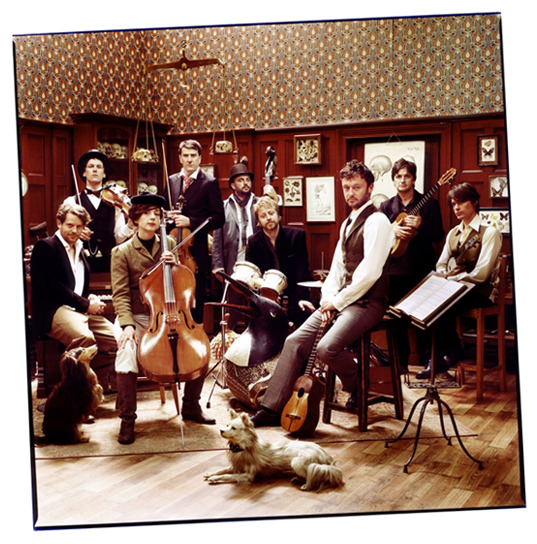
Photograph by Steve Gullick
How have you come to be working under a similar name?
AJ: Well, he died in 1997 and the people who had been playing in the line up at the end, we played a memorial concert at the Union Chapel in 2007 to mark the ten years since his death. It was amazing to have the music played out live again. It was such a treat for me because I had grown up with the music. About a year later I was getting ready to play a festival that my friends were putting on in Italy and I got three musicians that I had been working with and we just played a bunch of my dad’s music. Again it was such a positive and energetic experience that when we got back we thought we’d play at someone else’s Christmas party and we added some more members and it just started to snowball from there. We started booking actual gigs and did a bunch of festivals in 2009. We were borne along by the sense that everyone was so happy to hear it get played. The press did get confused about whether we were the Penguin Cafe Orchestra and we’d try and clarify that we were just playing the Penguin Cafe music. We were in some ways carrying on a different chapter. And it’s not something that’s been done before.
Well, the music has a warmth and vitality that I find is a useful antidote to modern urban life. And the name also suggests a gentle, British surrealism which perfectly matches the odd mix of genres that goes into the music.
AJ: Absolutely.
It’s fast approaching the 40th anniversary of your dad founding the PCO [in 1972 with Helen Liebmann]. How do you approach keeping the music fresh sounding?
AJ: Well the way we’ve done it so far is we’ve gone through all the versions that have been recording and we’ve made sure that everyone knows the history of the piece. But because we’ve got different players coming in who come from different fields, different things emerge from the music. For example we’ve got a double bass and a robust percussion section. We let the pieces go where they want to go without becoming a museum for pieces from the past. We make sure that we know our stuff, then we let them go where they will.
To a layman such as myself, what would you say are the main difference between the new and old compositions?
AJ: Well, the new compositions are by me and they’re placed within the philosophy of the Penguin Cafe Orchestra as I’ve understood it from my father. It’s a very fertile place to work to take an idea and explore it in quite a playful way until you find something that feels right and go from there without turning it into something… It’s a bit like the Jackie Collins idea that if you look at yourself in the mirror you should take off the first thing that you notice that you’re wearing. So when I listen back to the pieces, the first thing I notice standing out, I remove and it’s just a way of making sure that it doesn’t become one particular thing too quickly.
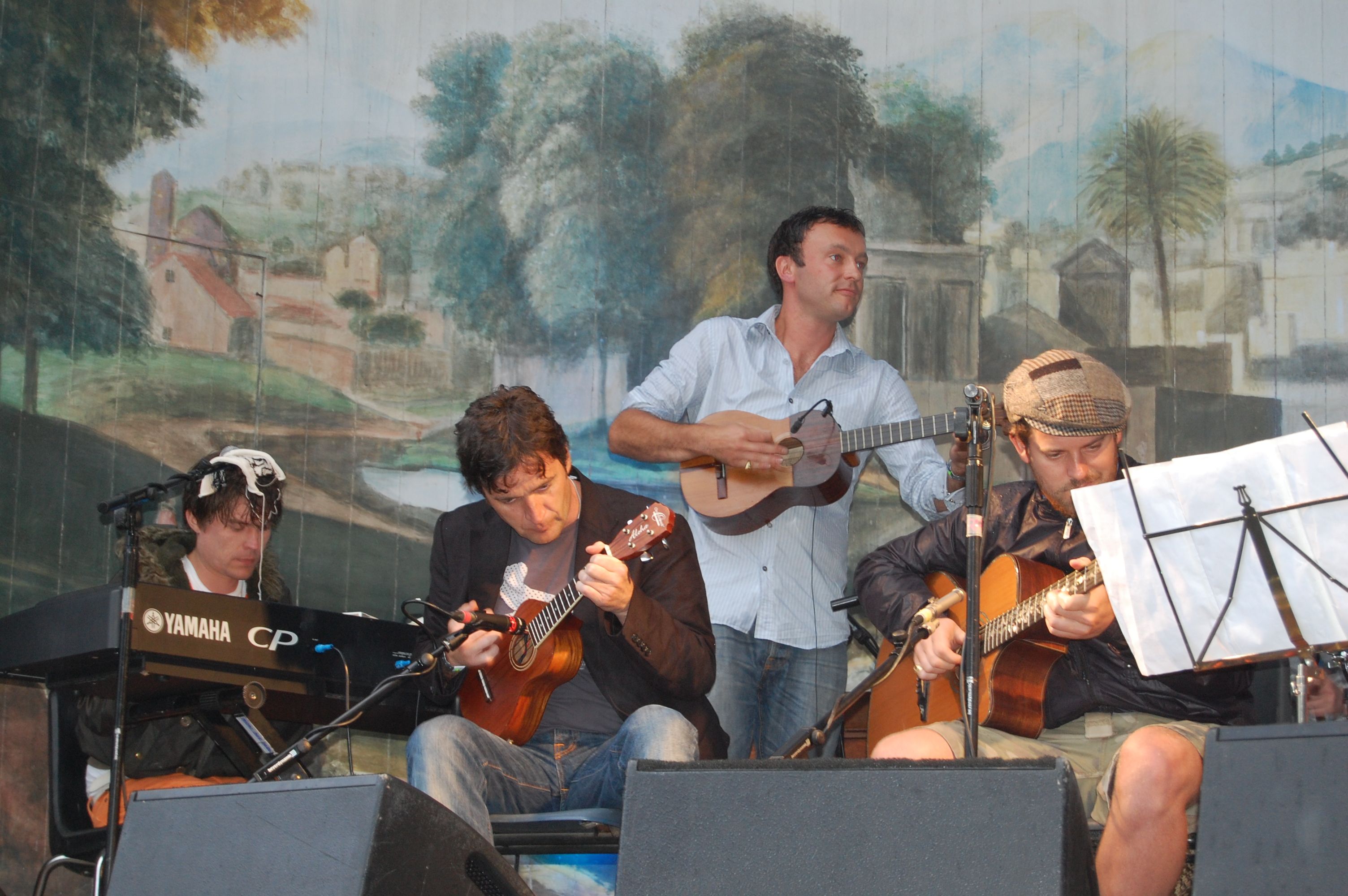
Obviously you’ve been playing your dad’s material for some time now but have there been any of the songs where you’ve thought, ‘I’m just going to leave that be. I’m not going to touch that one.’
AJ: There are some pieces which lend themselves better to our line up and some that don’t. There is quite a lot of studio stuff which is amazing but is impossible to recreate live. So we don’t do Wildlife or some of the early things off the first Zopf mini-album that gets very experimental way. I guess we focus more on the chamber and guitars and percussion based stuff.
When I was younger and used to look for PCO albums in record shops I’d often find them in really odd sections such as Krautrock or Avant Garde, and despite having vague strands of that in some songs, those descriptors are inappropriate. For someone who hasn’t heard the music, how do you actually describe it?
AJ: First of all it’s notoriously difficult to describe… I think it’s a product of how the music is written, so it doesn’t go in any pigeon hole very easily. In the past it’s been put in everything; rock, pop, avant garde, jazz, world, dance… Cafe Del Mar had a bunch of PCO tunes [on a compilation]. At the moment I jokingly call it minimalist chamber folk but that doesn’t allow for all the country and Cajun influences it has. It’s a happy mish mash of all sorts of things.
Given this wealth of music that permeates the records, what had been your dad’s background before forming PCO?
AJ: He trained as a classical guitarist and moved away from that world because it was a bit too constrained. He moved into playing avant garde stuff with the Omega Players. Then he moved on to Musicians In Green Clothes which would also feature some long term members of Penguin Cafe Orchestra. He moved slightly towards pop. He moved around looking for a place to be creative in and not finding one he became that place himself.
I guess an early influential figure in the history of PCO was Brian Eno.
AJ: The first Penguin Cafe Orchestra album was I think number seven on the Obscure label. He produced various people on it as well. Music For Airports was always something that Dad really, really loved. And then also the idea of music being… not a fifth wall exactly… but something to go in a space rather than just a narrative form. That lack of directness in his music was something that informed their music. Someone once described Penguin Cafe as electronica done with real instruments and I think there’s a bit of that in it.
I can hear that in tracks like ‘Surface Tension’.
AJ: Yeah, exactly.
The titles of some of the tracks tell the story of their own creation in a very direct way. ‘Telephone And Rubber Band’, for example.
AJ: Yeah. My dad made a phone call from the studio in the late 70s and he got a crossed line between a ring tone and an engaged tone. And if the engaged tone in G, gives you 4/4, then the ring tone in A gives you a slightly off set motif. This gives you this rather nice rhythmic passage. So rather than hanging up he unscrewed the bakelite receiver and the speaker on the phone hand set and then attached the cables with some pliers to a tape machine. He then made a loop out of it. Then he started playing violin with it. Apparently there was a white chair which had a rubber band attached to it with a pick up to make the bass line. The early versions of ‘Telephone And Rubber Band’ are pretty much that. My dad wasn’t even a violin player but he just kept it as it was.
It’s a very DIY punk or post punk way of doing things.
AJ: Well it is. The punk sense of you can do it yourself, just done in such a delicate and unusual way.
Talking of punk, is it true that your Dad arranged the strings to the Sid Vicious version of ‘My Way’?
AJ: Absolutely true yeah. He used to do these strange things. He taught Burundi drumming to Adam And The Ants.
And not wanting you to totally state the obvious but how about ‘Music For A Found Harmonium’?
AJ: I think ‘Music For A Found Harmonium’ has had the broadest travels around the world out of any of the songs. It started off in Kyoto, Japan where my Dad was staying with some friends writing. One day walking home he noticed that there was a harmonium just out there on the pavement. He left a note on it saying, ‘Who does this belong to? Because if you don’t want it we’ll have it. We’ll come back tomorrow.’ He came back the next day and it was still there with the note still on it so he took it. I think he wrote ‘…Harmonium’ quite quickly. Now it does get played by all sorts of people. In fact if you look it up on iTunes, you can see it attributed to Anon as a traditional Irish tune. It was on Napoleon Dynamite recently and on Malcolm a few years back.
Something that blows me away is the fact that when Penguin Cafe bumped up to the full orchestra in 1978, the first gig they did was supporting Kraftwerk at the Roundhouse on The Man Machine tour. That sounds like the greatest gig ever. Did your dad ever talk about it?
AJ: He didn’t but he did keep on buying me Kraftwerk albums when I was young. I have a very fundamental familiarity with the band. He just loved them.
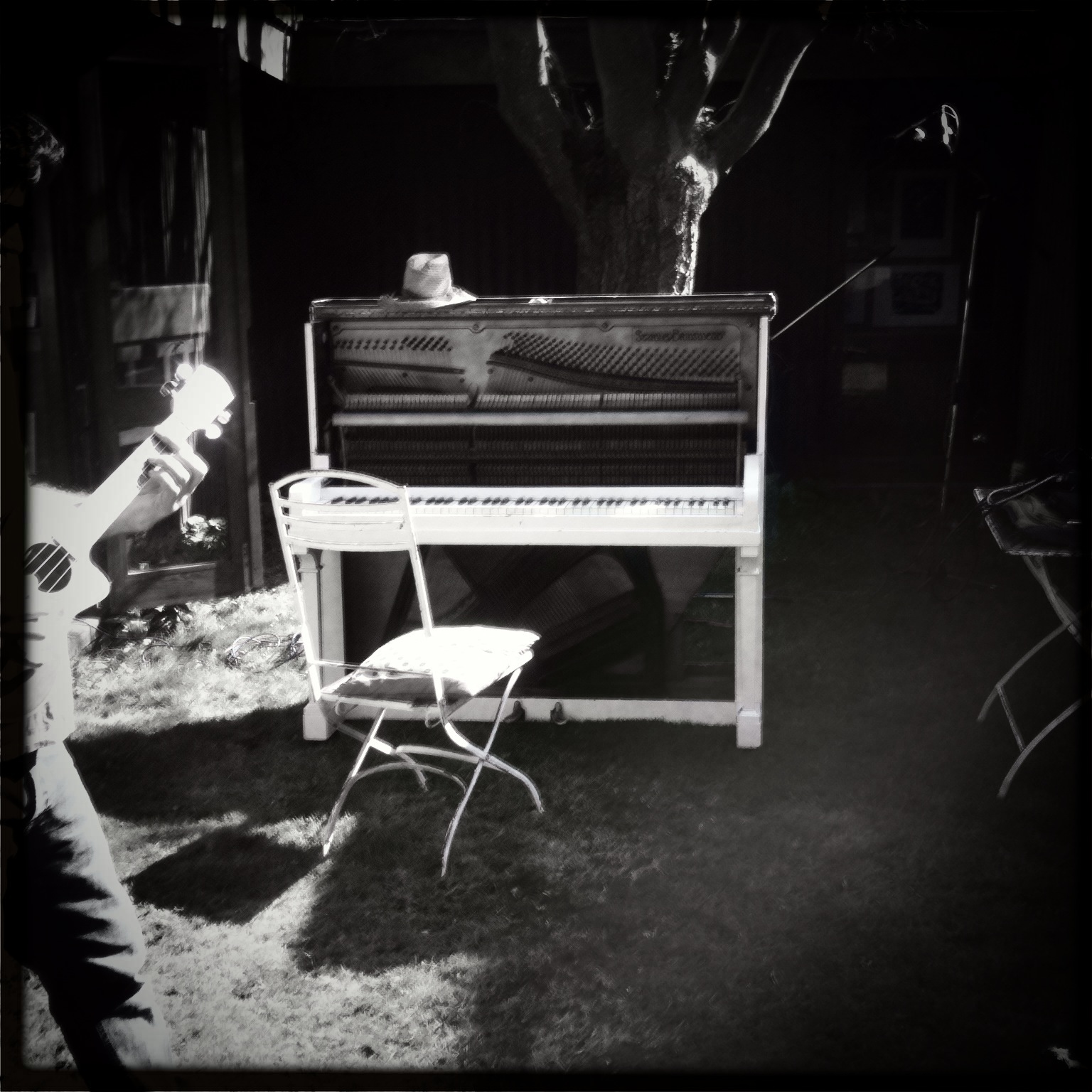
How did your Dad’s death change your relationship with his music?
AJ: I think certainly a lot of the enjoyment I get from playing his music now certainly is a way for me to stay in touch. You get such a sense of my dad as a person from the music. It’s a true expression of who he was and how he thought.
How has the name been squared with the other people who used to be in PCO, some of whom have become The Anteaters?
AJ: Well certainly some of them got grumpy when it first came out that we were doing some PCO music. I think it was our first London gig and Time Out accidentally billed us as The Penguin Cafe Orchestra instead of playing music by The Penguin Cafe Orchestra and it was just such a nightmare with a lot of people very upset. Understandably so. Now we’ve changed it to just Penguin Cafe to keep things simple. The thing that drives me forward is that it’s such a joyful experience every time we play. And I think that in future I don’t want to upset anything and I’d just like to concentrate on the good things and to keep moving forward.
The Quietus are all massive fans of Suede and we think that it’s awesome that you’ve got Neil Coddling in Penguin Cafe. How do you know him and how did he come to join?
AJ: He joined early on. I’d known him from doing other bits and bobs with various musicians in West London. Neil’s got exactly the right sensibility and he’s such a talented musician.
You’ve also got a member of Gorillaz which means you’re only one step removed from having a guest appearance by Mark E Smith.
AJ: [laughs] We don’t have any lyrics.
So you’re friends with the Guillemots. Are you only allowed to be friends with ornithologically monikered bands? Are you friends with the Eagles or Swans?
AJ: Not yet. Maybe we could start a bird themed festival that we can all play.

